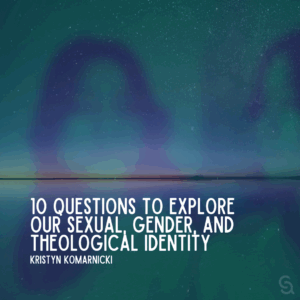 This month, we are looking at the topic of Identity and how our identity is formed through our experiences, faith journeys, the stories we’ve been told and the stories we ourselves tell. We may be given an identity by those who raised, taught and shaped us in a variety of ways, but the identities we embrace most healthily and holistically are those we discover through a process of self-reflection and community exploration. Brave, open-ended, deeply curious, challenging but compassionate questions are often at the heart of this discovery process.
This month, we are looking at the topic of Identity and how our identity is formed through our experiences, faith journeys, the stories we’ve been told and the stories we ourselves tell. We may be given an identity by those who raised, taught and shaped us in a variety of ways, but the identities we embrace most healthily and holistically are those we discover through a process of self-reflection and community exploration. Brave, open-ended, deeply curious, challenging but compassionate questions are often at the heart of this discovery process.
Below are a handful of precisely those kinds of questions. Intended to probe our hearts in the core areas of sexual and gender identity and how these intersect with and are informed by our faith, they represent a small sample of the questions created by the courageous people who have participated in an Oriented to Love dialogue. We share them here as a fruitful conversation tool for all who engage these issues deeply both within themselves and with those who believe and live differently from them. We encourage you to take some time this month to take a personal assessment, reflecting on these questions. For more information on the topic of sexuality and gender identity, visit our Oriented to Love page.
- What do you feel is most at stake for you personally, and for the church in general, in the conversation about human sexuality?
- What do you believe is the “other theological side’s” best argument, and what do you believe is your side’s weakest argument? How does it make you feel to discuss this?
- What are your greatest struggles related to sexuality or gender expression?
- What has been key in shaping your theology and beliefs around gender and sexuality?
- What is your understanding of the role of suffering and the role of joy in the Christian life? How does your theology of suffering inform and intersect with your theology of sexuality? How does your theology of joy inform and intersect with your theology of sexuality?
- What is your vision for reconciliation in the Church around sexuality and gender?
- What are the key ways you want to grow in your faith, and what would it look like for you to more faithfully follow Jesus in the areas of sexuality and gender?
- How do you apply grace in situations where someone’s theological belief conflicts with your own?
- How can we—all of us—hold firm convictions, but in a humble way? How can we avoid the sin of arrogance in assuming we are categorically right about a thing while someone else is categorically wrong?
- What have you learned from someone who holds a different theology on sexuality and gender from yours, and how has that learning affected you?
Kristyn Komarnicki is director of dialogue and convening for Christians for Social Action. She leads the Oriented to Love dialogue program, helping diverse Christians build a unity that is deeper than agreement.
is director of dialogue and convening for Christians for Social Action. She leads the Oriented to Love dialogue program, helping diverse Christians build a unity that is deeper than agreement.


